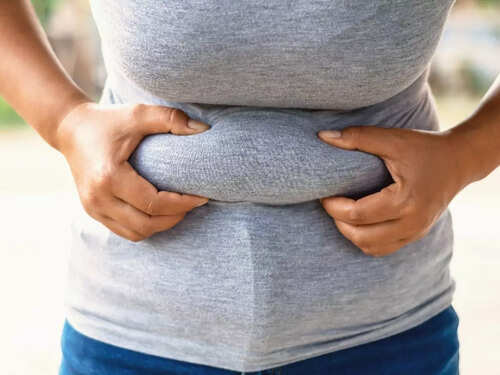Understanding the differences between bloating and fat.
Understanding the differences between bloating and fat.
Blog Article
Exploring the Difference Between Bloating and Fat: Vital Insights for Better Digestive Wellness
Understanding the distinction in between bloating and body fat is vital for people seeking to enhance their digestive health. While bloating is frequently a transient condition connected to nutritional behaviors, body fat stands for an extra steady aspect influenced by long-lasting way of life options.
Recognizing Bloating

Additionally, bloating can be intensified by problems such as cranky bowel syndrome (IBS) or food intolerances, where the gastrointestinal system has a hard time to process particular compounds properly. Eating also rapidly, eating carbonated beverages, or over-eating can likewise activate bloating by increasing the quantity of gas and food within the stomach and intestinal tracts.
Tension and hormonal adjustments can affect gut motility and add to bloating also. Acknowledging the triggers particular to a person's way of life and diet regimen is crucial for managing this problem. On the whole, understanding the multifaceted reasons of bloating is essential for creating efficient strategies to reduce pain and boost digestion health.
What Is Body Fat?
Body fat, a crucial component of human physiology, offers several functions past merely providing power storage. Made up mostly of adipocytes, or fat cells, body fat plays a critical role in maintaining total health and wellness. It is classified into 2 main types: subcutaneous fat, situated just under the skin, and visceral fat, which surrounds inner organs. Each kind has distinctive ramifications for health and metabolism.
In enhancement to power storage space, body fat is integral to hormone guideline, insulation, and security of important body organs - bloating and fat. It acts as a tank for fat-soluble vitamins, such as A, D, E, and K, facilitating their absorption and metabolic utilization. Adipose tissue is metabolically active, generating hormonal agents like leptin and adiponectin, which are involved in appetite regulation and insulin sensitivity.

Body fat also plays a role in thermoregulation, aiding to keep body temperature. While some quantity of body fat is necessary for wellness, excessive accumulation can result in conditions such as weight problems, diabetes, and cardiovascular condition. Understanding the complexities of body fat is crucial for advertising better health and stopping disease, emphasizing the importance of balanced body make-up.
Key Differences Between Bloating and Fat
Frequently misconstrued, bloating and body fat are two distinct conditions that can affect an individual's appearance and comfort. Bloating refers to an awkward swelling in the stomach location triggered by excessive gas or fluid retention, leading to a momentary increase in size. This condition can fluctuate throughout the day, typically connected to dietary options or digestion concerns, and is identified by feelings of fullness or pressure.
On the other hand, body fat is a stable component of body make-up, standing for kept energy and playing a critical duty in numerous physical features. Unlike bloating, body fat does not commonly rise and fall swiftly and is influenced by long-term nutritional routines, task levels, and metabolic aspects. It gathers with time, contributing to overall body shape and health.
In addition, while bloating can cause pain and might be minimized with nutritional modifications or lifestyle adjustments, body fat decrease typically calls for a more prolonged dedication to diet and workout - fat and bloating. Identifying these differences is crucial for recognizing one's body and handling wellness properly, as each problem requires distinct strategies for enhancement and alleviation
Reasons For Bloating
Bloating can occur from a variety of underlying elements, each adding to the uncomfortable experience of fullness and stomach swelling. One key reason is the intake of air, which can take place while consuming or consuming also rapidly. This too much air can accumulate in the gastrointestinal system, bring about pain.
In addition, specific foods are well-known for creating bloating, specifically those high in fiber, such as beans, lentils, and cruciferous vegetables. These foods can lead to enhanced gas manufacturing throughout food digestion. Lactose intolerance is one more significant factor, as individuals lacking the enzyme lactase may experience bloating after eating milk items.
Moreover, sweetening agents, particularly sugar alcohols, can disrupt intestine feature and create bloating. Food poisonings, such as cranky digestive tract disorder (IBS) and gastric condition, can also manifest as bloating because of damaged digestion or swelling.
Hormonal fluctuations, particularly during menstruation, can lead to momentary bloating too. Stress and anxiousness can intensify digestive concerns, additionally adding to the sensation of bloating. Recognizing these causes is vital in resolving and minimizing this get more typical discomfort.
Tips for Managing Digestive Health
Dealing with the factors that add to bloating is simply the beginning of advertising much better gastrointestinal health and wellness. Foods such as fruits, vegetables, and entire grains advertise regular bowel motions and reduce the possibility of constipation, a typical More hints trigger for bloating.
Hydration plays a critical duty also; ample water intake helps the digestive system function optimally and can minimize bloating. difference between bloating and fat. In addition, exercising conscious eating-- such as eating food extensively and consuming slowly-- can help in food digestion and lessen air ingesting, which usually exacerbates bloating

Last but not least, integrating probiotics into your routine, whether through supplements or fermented foods, can foster a healthy and balanced digestive tract microbiome, additionally sustaining gastrointestinal processes. By welcoming these strategies, individuals can attain a much more well balanced and comfy gastrointestinal experience.

Conclusion
In final thought, distinguishing in between bloating and body fat is critical for maximizing digestion wellness and overall health. Bloating, typically a temporary condition linked to nutritional options, contrasts with body fat, which shows long-lasting way of living habits. Identifying the causes and symptoms of each can guide individuals in making educated dietary changes and way of living modifications. Ultimately, this understanding promotes far better administration of digestion health and wellness and supports efforts visit this website toward sustainable fat reduction.
Report this page